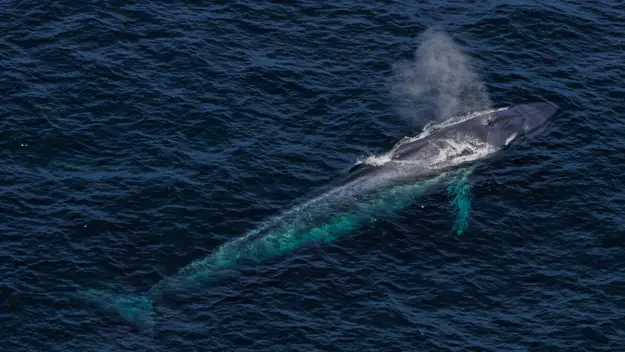Québec–Tadoussac Fall Cruise: Colourful Landscapes & Whale Watching
We all know the scenic drive between Québec City and Tadoussac, with its sweeping landscapes and charming villages. But have you ever considered making the journey by river instead? Hidden treasures await on the St. Lawrence, sights you simply can’t experience any other way.
Here are 10 unforgettable highlights revealed only to those who take the road less traveled—aboard a round-trip cruise between Québec City and Tadoussac.
1. Île d’Orléans
From the river, Île d’Orléans opens up in all its beauty: orchards, traditional homes, and farmland that tell the story of more than four centuries of history. One of the first settled areas in the St. Lawrence Valley, it has kept its agricultural character, with 95% of its land still devoted to crops—strawberries, potatoes, vegetables, and berries. From the water, you can spot stunning examples of traditional French architecture from the 17th and 18th centuries: stone houses, parish churches, presbyteries, and centuries-old barns. Living traces of Québec’s rural past!
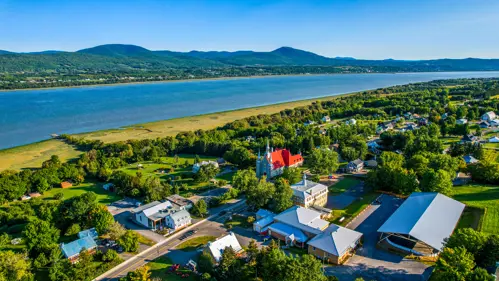
2. Cap-Tourmente National Wildlife Area
On the north shore, just past Île d’Orléans lies the Cap-Tourmente National Wildlife Area. This unique protected site is home to more than 180 bird species, 30 mammals, and 700 plant species. During spring and fall migrations, tens of thousands of snow geese gather here—a truly breathtaking sight. Keep your eyes peeled: you might witness these stunning flocks right from the river!

3. Isle-aux-Grues Archipelago
At the heart of the St. Lawrence lies the Isle-aux-Grues archipelago, made up of 21 islands, each with its own story. The most famous, Isle-aux-Grues, inspired many artists, including famous painter Jean-Paul Riopelle, who moved there late in his career with his wife. From his riverfront home, he observed the snow geese whose majestic flights deeply influenced his work. His time here sparked some of his most iconic paintings, born from his closeness to nature.
4. The Charlevoix Mountains
Few viewpoints showcase Charlevoix like the St. Lawrence does. From the water, the mountains plunge directly into the river, drawing a spectacular panorama that changes with the light. As your cruise continues, the landscape constantly shifts—revealing sheer cliffs, rocky headlands, and lush valleys in turn. A perspective that will leave you in awe!
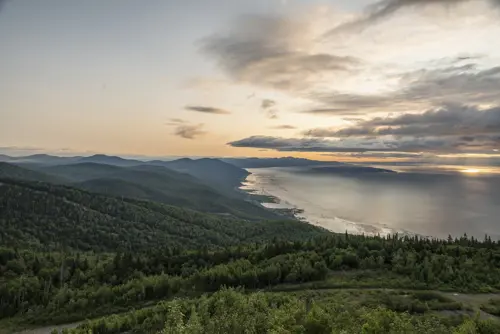
5. Île aux Lièvres
Named by Jacques Cartier for its abundance of hares, Île aux Lièvres is now celebrated for its pristine beauty and rich biodiversity. With hiking trails, hidden beaches, and peaceful forests, it’s a true sanctuary for nature lovers. The island is also home to seals, seabirds, and rare plant species. Stretching 13 kilometers long, it remains one of the estuary’s best-kept secrets—an ideal spot to add to your camping list for next summer!
6. Pot à l’Eau-de-Vie Lighthouse
Just one kilometer from Île aux Lièvres stands a true gem: the Pot à l’Eau-de-Vie Islands Lighthouse. Built in 1862 and recognized as a National Historic Site, it guided sailors for more than a century before being decommissioned in 1964. Recently restored, it now houses a unique inn. Sleeping in a lighthouse? That’s an experience you won’t forget!
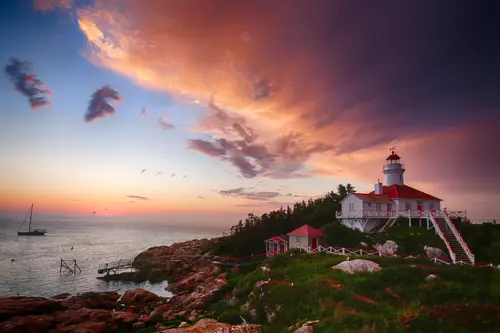
7. Québec’s Most Beautiful Villages
As you sail, you'll be charmed by the picturesque villages that line the St. Lawrence. On the way, you’ll spot Baie-Saint-Paul, Petite-Rivière-Saint-François, and Saint-Joseph-de-la-Rive, as well as La Malbaie and Saint-Siméon—where cliffs, heritage homes, and natural scenery blend beautifully. Of course, the journey wouldn’t be complete without Tadoussac, one of Québec’s prettiest villages and the oldest, with more than 410 years of history.
On the return journey, more treasures await: Kamouraska, L’Islet-sur-Mer, and Saint-Jean-Port-Joli, known for their colorful homes, charming wharves, and living artisan traditions. Each village adds its own touch of character to this unforgettable river cruise.
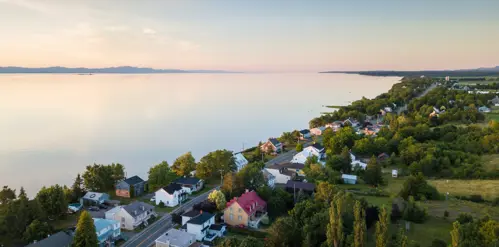
8. Saguenay–St. Lawrence Marine Park
Where the fresh water of the fjord meets the salt water of the river, the Saguenay–St. Lawrence Marine Park stretches across 1,245 km², making it a truly unique protected area. Nearly 2,200 species live here, including many endangered ones. It’s also one of the best whale-watching spots in the world—up to 13 species of whales frequent these waters, from minke whales and humpbacks to the majestic fin whale. Onboard, a naturalist shares insights into the fascinating lives of these giants of the sea.
9. Saguenay Fjord
The Saguenay Fjord, stretching over 100 km and plunging as deep as 275 m, is actually a glacial valley carved long ago. Its towering cliffs, some reaching 450 m high, glow with autumn colours and shelter a remarkable diversity of wildlife—from belugas and seals to countless seabirds. Venturing into the fjord is to marvel at nature’s grandeur.

10. Haut-fond Prince Lighthouse
An emblem of Tadoussac, the Haut-fond Prince Lighthouse—affectionately nicknamed La Toupie (“the Spinning Top”) by locals—has been guiding sailors for over a century. Its light, stretching 33 km across the water, still ensures safe navigation today.
Nearby, the Île Rouge Lighthouse, rising 15.5 meters, watches over its namesake island, completing this iconic duo and offering a unique maritime panorama.
✨ To see these 10 must-sees from a truly unique perspective, step aboard a cruise between Québec City and Tadoussac. Between breathtaking landscapes, incredible wildlife, and living heritage, you’ll experience Québec in a way that will stay with you for years to come.
Since this cruise is offered on one date only, spots are limited!




